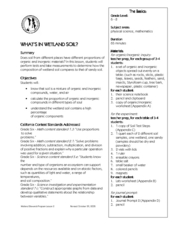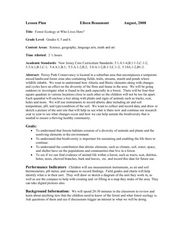Curated OER
Greatest Common Factor: Using the Factor Tree
Students find the greatest common factor of two numbers. In this algebra lesson, students use prime factorization to find their factor to simplify equations. they create a factor tree to find the factors of composite numbers.
Curated OER
Abiotic and Biotic Factors
Students examine abiotic and biotic factors. They define biotic and abiotic, categorize a list of items onto a Venn diagram, label various items from areas on the school grounds as biotic or abiotic, and diagram a magazine picture.
Curated OER
Super Size It, Please!
Pupils take photos from a given distance and determine the height of the person using a scale factor. Pupils calculate the ratio of student actual height to student photo height. They take pictures from 3 different distances to see if...
Curated OER
Prime & Composite Numbers: Algebra/Geometry Institute 2009
Students create factor trees. In this prime and composite lesson, students model fractions using tiles. They create factor trees and identify prime and composite numbers. Students use grid paper and tiles to model...
Curated OER
Extraordinary Extrapolation
Students study how scientists have estimated the maximum height to which trees can grow, and assess the reliability of interpolation and extrapolation techniques by making predictions with particular data sets and analyzing accuracy of...
Curated OER
The Fair Factor
Students participate in playing many games to determine if they are fair or not. They create their own game that is fair to play with their classmates.
Curated OER
Trees For Trout!
Fourth graders determine the impact of native forests, local clearcuts and local clearcuts and local reforestation projects on the survivablity of Rainbow Trout in their area. They record and document the stages of the trout throughout...
Curated OER
Carrying Capacity of Ecosystems
Students define population and carrying. In this algebra lesson, students explore exponential growth and decay based on animals and things that grow or decrease exponentially. They graph their findings and discuss their results as they...
Curated OER
How Healthy is the Wetland?
Young scholars explore wetlands. In this ecology lesson, students visit a wetland site and collect data about the wetland functions. Young scholars record their results and use the data recorded to rate the wetland site on its function.
Curated OER
Plant Diversity and Distribution
Learners construct a defined plot on school grounds and observed patterns in plant life. They count trees, shrubs, cacti and record on a data sheet. They compare data and generate a plant diversity overlook for their school.
Curated OER
Similar Triangles - Applied Problems
Students differentiate between similar and congruent triangles. In this geometry lesson, students identify the angles of triangles using the similarity theorem. They apply concepts of triangles to the real world.
Curated OER
Maximizing Lumber Cuts
Students examine how lumber companies use each tree to the fullest extent. They practice using a saw blade in which they cut a piece of wood in different configurations to see which cut can waste the least.
Curated OER
What's in Wetland Soil?
Students examine the organic and inorganic components of soil. In this environmental science lesson, students identify the factors that influence soil formation. They collect soil samples, conduct tests, and analyze the results.
Curated OER
Forest Ecology or Who Lives Here?
Students explore a hardwood forest. In this forest ecology lesson, students examine the diversity and animals and plants as they explore their habitats at Poricy Park Conservatory. Students determine how biodiversity and abiotic elements...













